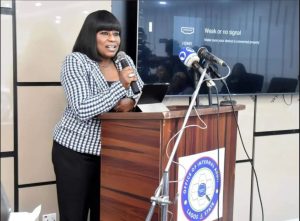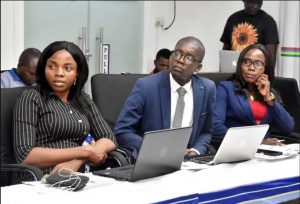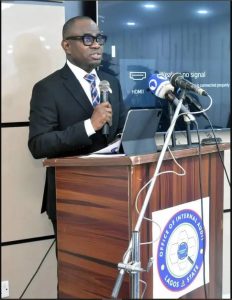
CAPACITY BUILDING: CANADIAN UNIVERSITY TRAINS LAGOS INTERNAL AUDITORS (PHOTOS)
By Ajape Sefiu A.
….Targets Increased Non-Tax Internally Generated Revenue
The University of Calgary in Canada has been engaged by the Office of Internal Auditor to conduct a five-day training program for a selected group of internal auditors titled “Revenue Systems Audit Champions” held at Ikeja.
The purpose of the skill set and capacity training for selected internal auditors in service is to expose them to global standards and procedures for auditing electronic revenue collections and revenue management, according to Dr. Oyeyemi Ayoola, Special Adviser to the Lagos State Governor on Internal Audit, who gave an explanation of the training’s rationale during the opening ceremony on Monday.
The Special Adviser insisted that the State Government must increase its non-tax internally produced revenue in order to meet the demands of Lagosians for a high standard of living and to continue implementing the THEMES Plus developmental agenda of the current government.

She claims that the employment of auditors by the Lagos State Government will help the government prevent revenue leaks, lower the risk associated with revenue collections, and eventually work with other stakeholders to increase non-tax IGR from 18% to 40%, adding that it will free up more funds for projects that will improve the security, health, and education sectors of the Lagos economy, ultimately improving the general standard of living for Lagos residents.
Going further, she revealed that the curriculum of the training delves into advanced systems revenue auditing techniques, with a focus on the non-tax revenue collection cycle, and provides the internal auditors with audit tools needed to navigate complex revenue management and financial structures.
Her words are, “The collaboration between Lagos State and the University of Calgary serves as a testament to our dedication to fostering an international partnership that will contribute to the economic growth and sustainability of the same in Lagos. With this partnership, Lagos State has positioned itself at the forefront of innovative financial strategies, leveraging international expertise to maximize its revenue potential.”
She revealed that the collaborative training program also creates opportunities for knowledge sharing between internal auditors in Lagos and their Canadian counterparts. She emphasized that the cross-cultural expertise sharing is anticipated to enhance the training program by giving auditors a worldwide outlook on financial compliance and non-taxable revenue management.

According to Dr. Ayoola, the training will emphasize strict compliance with applicable standards of revenue collection from revenue payers while blocking identified loopholes in the revenue collection cycle system. This is in addition to the expectation that internal auditors will play both preventive and corrective roles in auditing.
As revenue production precedes expenditure, she advised the state’s compliance officers, the auditors, to refocus their attention from primarily auditing expenditures to auditing revenues.
Also speaking to participants at the workshop, Mr. Abdukabir Ogungbo, Special Adviser to the State Governor on Taxation and Revenue, said that the goal of the program is to make sure that non-taxable revenue rises dramatically, enhancing the state’s financial capacity.

In order to guarantee that the state is at the forefront of upgrading its internally generated revenue for developmental reasons, he hailed the collaboration project with the University of Calgary, Canada, as a positive development for the state government.
Furthermore, the Office of Internal Audit’s Permanent Secretary, Mrs. Kikelomo Dawodu, FCA, asserted that in order for the state to continue developing its infrastructure, it must have enough money, which means it must increase its non-tax internal revenue.
She stated that the goal of the revenue system auditing in Lagos State is to stop leaks and that the training will introduce participants to various strategies for closing detected gaps using cutting-edge technology that will enable the auditor to find and fix mistakes immediately.
![]()
